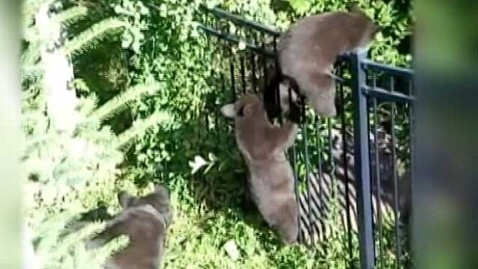Bear Epidemic Expected to Worsen in the West

Image credit: ABC NEWS
Across the West, communities are in the midst of a black bear epidemic this summer as the hungry critters venture into backyards and neighborhoods in a search for food.
Cities like Vail, Colo., have received more than 50 calls about problem bears in August alone. Bear calls are also skyrocketing in places like Aspen. Police there recorded 292 calls about bears in August, compared to only 38 last year, according to the Aspen Times.
The bear encounters has largely been fueled by a search for food, something bears will need a lot more of as they bulk up for winter hibernation. In other words, the problem is about to get worse.
"They're looking at trying to consume 20,000 calories a day. They will spend 20 of 24 hours a day looking for food," said Randy Hampton with the Colorado Parks and Wildlife Department.
It's bad news for people like Melissa Carroll of Eagle, Colo. She's endured five separate bear invasions in her home this year, including one face-to-face encounter on her back porch. The bear tore its claws into a back door trying to escape, leaving behind serious damage.
"Seeing one right like that, it took me a long time to calm down," she told ABC News.
The Associated Press reported last week that a rancher near Chocteau, Mont., returned home to find a black bear in his home eating peanut butter and flour. Rancher Lane Yeager shot and killed the bear.
The wave of bruin break-ins can partly be blamed on severe drought. A lack of rain means natural foods are scarce, sending bears hunting for an easy alternative: people food. Bears have been spotted breaking into trash cans, searching for any calories they can get. One bear even broke into a candy shop near Estes Park, Colo., to steal sweets.
The bad news for bears is that human foods get them accustomed to people, which inevitably leads to trouble.
"Generally the bear has to be put down once it becomes aggressive," Hampton says.